#CAN'T BELIEVE I SPENT TIME ON THIS....
Text

a villager that is a cut above the rest
#clucky few#minecraft villager#zedaph (by association)#hermitblr#hermitcraft season 10#mcyt#can't believe i spent so much time on this guy#what if i told you i also have alternate designs#and lore ideas#and a love story idea brewing between him and Cptn Mendy II#truly dire
803 notes
·
View notes
Text
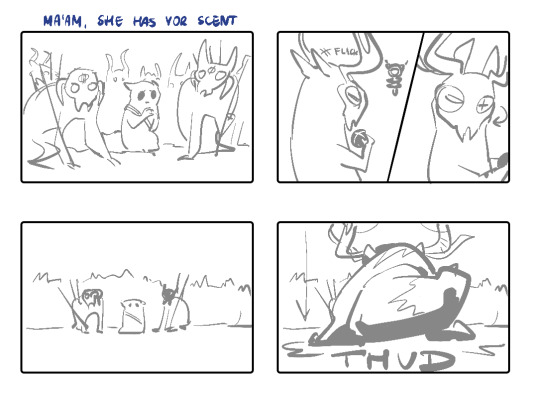

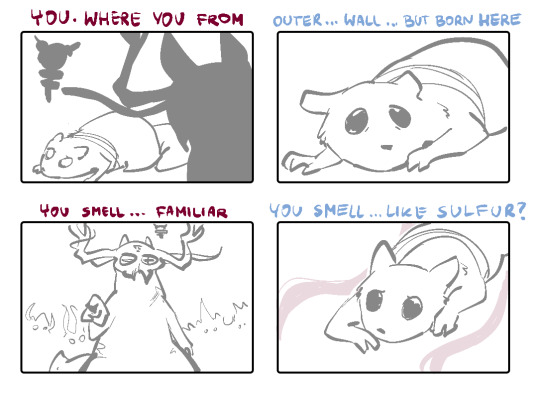

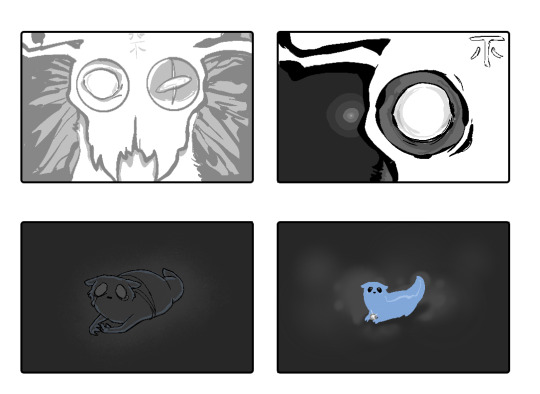
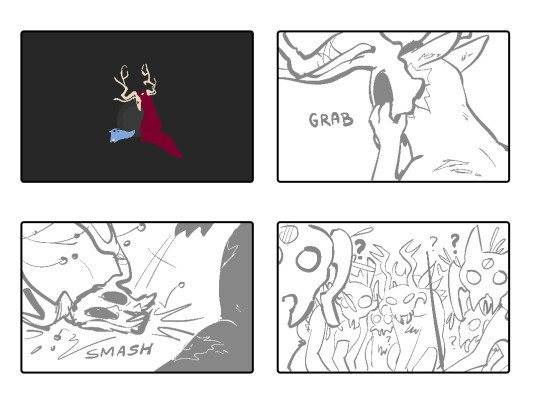
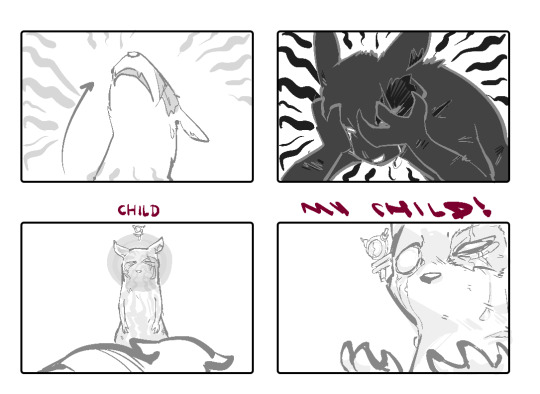

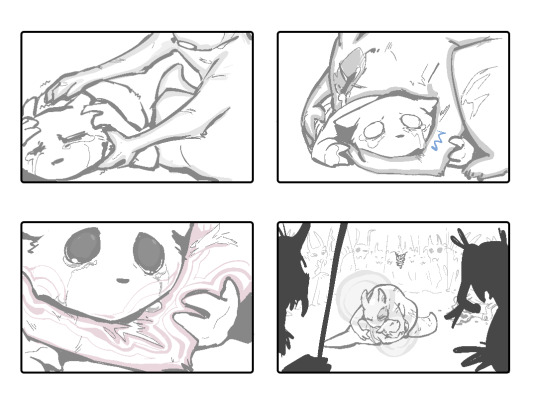
a child found
[part 1] // part 2 // part 3
#rain world#i can't believe i spent time drawing this#mf (me) plays rain world once then reads the entire wiki then draws this#tumblr is SO BAD with comics#i had to slice everything into manageable pieces so it wouldn't get compressed to poop jpeg#rw artificer#basically what if the blue pup survived#we never see it die#unlike the other green pup who drowned#comics are hard#kalivasquez#kalivasquezart#2024#rw spoliers#grey spoiler area but i'm tagging anyway#rw slugcat#rain world art#rw downpour#slugcat#rw pioneer#uuuh... spoilers?#rw spoilers
592 notes
·
View notes
Text


Incorrect Avatrice Quotes (1/?)
#avatriceedit#avatrice#warrior nun#ava silva#sister beatrice#beatrice#warrior nun crack#*iaq#myedit#*23#can't believe i spent precious time making this dumb set 😂#will i make more? indubitably 🙃🤡
1K notes
·
View notes
Text
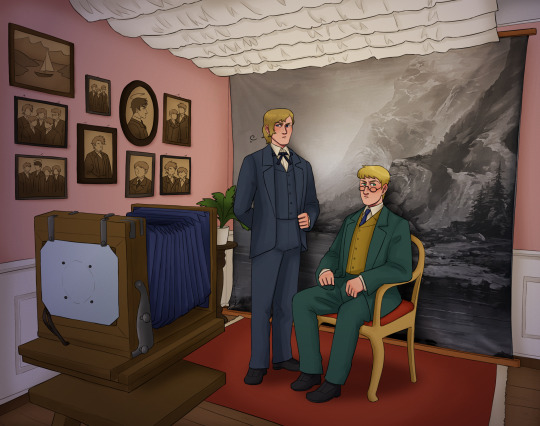
"Can you just imagine Norway and Sweden here, forced to take a picture together during their union in the 1800s??"
Or, something like that, is about what @cat-with-a-tie said just before requesting this exact scenario ✨
#hetalia#historical hetalia#aph norway#aph sweden#hws norway#hws sweden#sunor#none of them are happy to be there and would rather be anywhere else#lol I finally finished it!!#can't believe backgrounds are so time consuming even with a reference pic 😩😩😩#also the backdrop for the photo was just so pretty I didn't even try to replicate it#can't believe we spent 5 hours at the museum??? where did the time go??#and oustside while it was windy and snowing as well! How did we manage??#would do again tho
170 notes
·
View notes
Text

Chapter 107 sskk moodboard made exclusively out of the reactions from my activity page. Glad to see everyone has been coping well
#Finally went over my notes since chapter 107 dropped#sskk#shin soukoku#bsd#bungou stray dogs#bsd ch 107#mine#Can't believe the time I spent over this ahkjvblhbbvealkej well. goodnight
469 notes
·
View notes
Photo






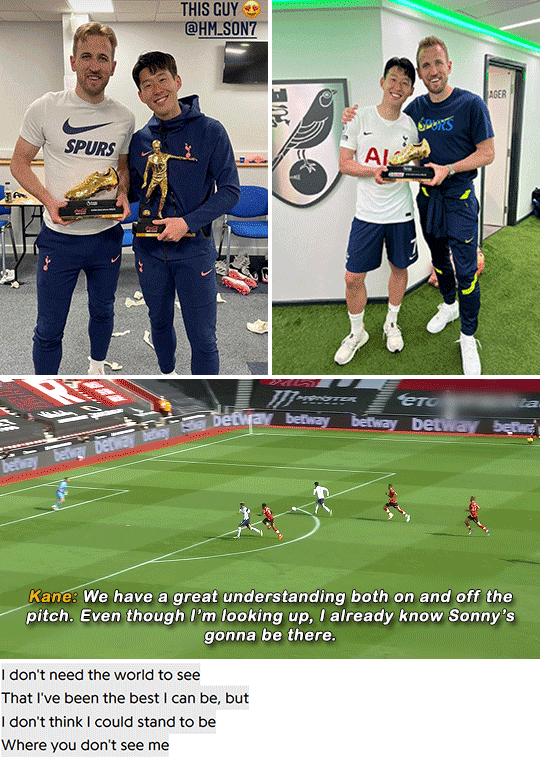
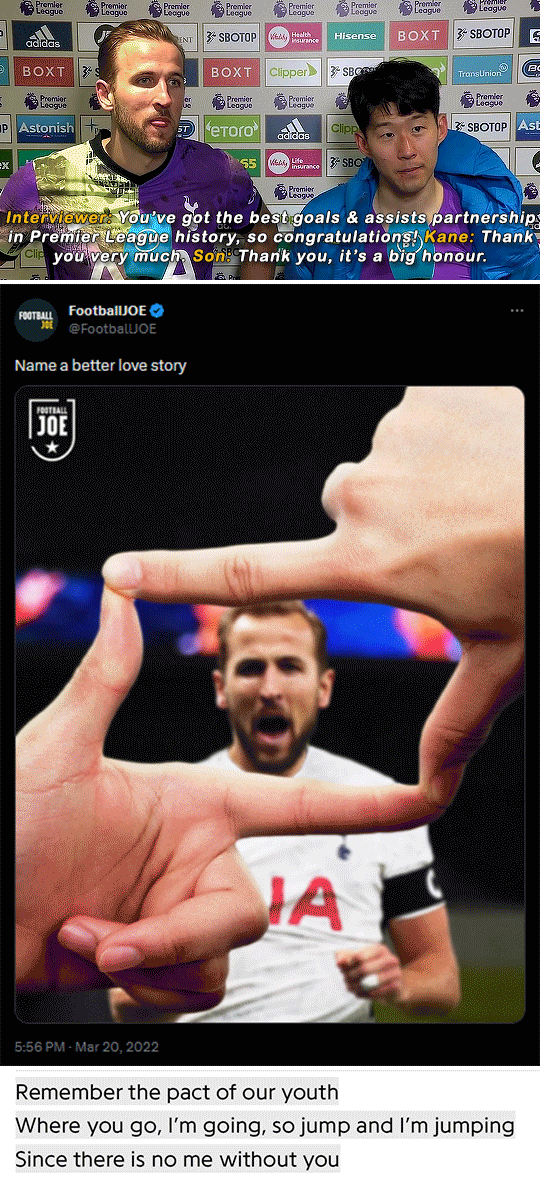
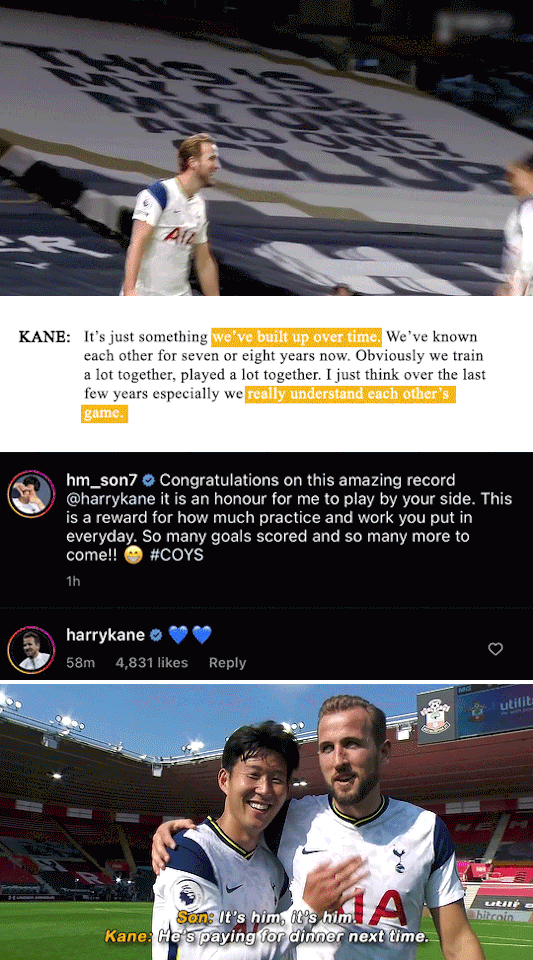

HARRY KANE (10) & SON HEUNGMIN (7)
OF TOTTENHAM HOTSPUR
The greatest partnership to ever exist in the world of football.
“When you turn, I will be always there.”
BBC Sport / Kane and Son break the all-time record for Premier League goal combinations / The Guardian / Kane-Son trademark celebration during Liverpool 1-1 Tottenham, 07th May 2022 / Kane-Son trademark celebration during Manchester United 1-6 Tottenham, 04th October 2020 / Kane-Son trademark celebration during Aston Villa 0-4 Tottenham, 09th April 2022 / Kane-Son trademark celebration during Tottenham 2-0 West Ham United / Kane on Twitter after assisting Son on 4 goals against Southampton / Tottenham 1-0 Burnley, 26th Oct 2020 / Nice to Mich You, Son Heungmin / Premier League / Kane and Son hug during Manchester City 2-3 Tottenham, 19th Feb 2022 / Kane and Son hug during Tottenham 1-0 Crystal Palace, 20th Sept 2015 / Kane consoles Son during the Carabao Cup final against Manchester City / Kane and Son celebrate during Tottenham 5-2 Southampton, 26th Dec 2017 / Commentator on the Kane and Son partnership / Tottenham 2-0 Arsenal, 06th Dec 2020 / Caption from ‘Heungmin Son and Harry Kane guess their Premier League goal combinations’ / Stray Kids, I am YOU / Kane and Son celebrate during a 6-1 game against Leicester City, 18th May 2017 / Kane and Son celebrate during a 4-0 game against Everton, 13th Jan 2018 / Kane on Twitter / Frank O’Hara, ‘Morning’ / Kane wins the Golden Boot 20/21 / Son wins the Golden Boot 21/22 / Kane assists Son against Southampton / Caption from ‘Heungmin Son and Harry Kane guess their Premier League goal combinations’ / Mitski, Francis Forever / YouTube: Record breakers! Kane & Son react to becoming Premier League’s most deadly duo! / FootballJOE on Twitter, referencing Son’s trademark goal celebration, the ‘camera,’ through which he is looking at Kane / Gang of Youths, ‘Achilles Come Down’ / Kane and Son celebrate their goal against Arsenal / Kane on his relationship and link-ups with Son / Son and Kane on Instagram / Kane and Son after Kane assisted Son on four goals against Southampton / Tottenham 3-2 Ajax, 08th May 2019 / cr. Shaun Botterill, Getty Images / Commentator on the Kane and Son partnership / Tottenham 3-2 Manchester City, 19th Feb 2022 / Caption from ‘Heungmin Son and Harry Kane guess their Premier League goal combinations’
#footballedit#kaneson#tottenham hotspur#harry kane#son heungmin#son heung min#heungmin son#heung min son#tottenham#football#this is my magnum opus i spent an actual insane amount of time on this ... there is something SO deeply wrong with me.#i feel like this isn't enough to encompass the love they have for each other there needs to be MORE ... but i tried my best#in the end do you ever think about how they both grew up on different sides of the world with nothing binding them apart from a shared#desire to play football and to be the best at it. and how more than 2 decades later they found each other in london and became part of each#other's stories. because that's the crux of it isn't it? there will be no book written about one of them without mentioning the other.#they've become so intertwined over the years you can't tell where one starts and the other ends.#the amount of respect and admiration that they hold for each other is actually insane. like sonny talking about how harry is the best#striker in the world and - not pictured here - how he believed he could win the golden boot at the world cup last year which uh.#that was never going to happen but it's the FAITH. the unwavering relentless FAITH!!! that he has in him :(((#or the DIFFERENT way harry loves sonny oh i could pen tomes about it really but the point is that he opens up around him and he sheds that#stoic and untouchable persona and actually laughs and giggles and smiles in interviews with him and never doubts him. ever.#i couldn't fit in 'never in doubt' here but NEVER IN DOUBT!!!#'when you turn i will be always there.' how goddamn romantic is that then.#the thing is that they were born to be together. they were meant to play with each other.#there will never be another duo like them.#rahul.gif
551 notes
·
View notes
Text

Listen, I'm just saying
#chris pine#chris pine glow up#nicholas devereaux#james tiberius kirk#james t kirk#james kirk#captain kirk#steve trevor#i can't believe i spent so much time making this#but this man has messed me up
555 notes
·
View notes
Photo
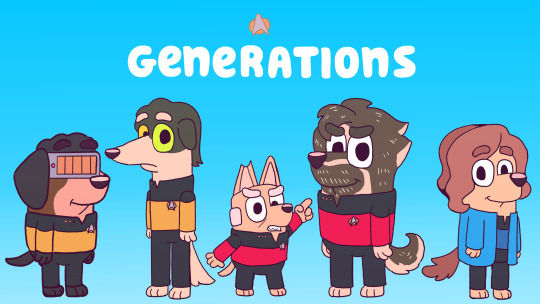
“This episode of Bluey is called ‘Generations’“
I promised to make this if the previous TNG Bluey post gets more than 5 notes so here it is! (Ft. Geordi the Beagle, Data the Borzoi, Picard the Chihuahua, Riker the Alaskan Malamute, and Beverly the Cocker Spaniel)
Next up is the Enterprise crew!
#star trek#star trek the next generation#star trek tng#st tng#star trek fanart#Geordi La Forge#Data Soong#jean luc picard#william riker#beverly crusher#bluey#bluey fanart#fanart#drawing#art#doodles#artsy ari#((This one's for the 10 star trek-bluey mutuals))#((enjoy whatever this is))#((I can't believe I spent time in this))
658 notes
·
View notes
Text


crow & his centurion buddy in the back of the helm this past week just 🧍♂️🧍♂️🍿
#this is one of the stupider things i have spent time on#destiny 2#crow destiny#calus#emperor calus#season of the haunted#i can't believe i finished this instead of any of my other art from this season. what#yes i copied calus from that study sheet i did a couple of days ago. do not examine me
1K notes
·
View notes
Text
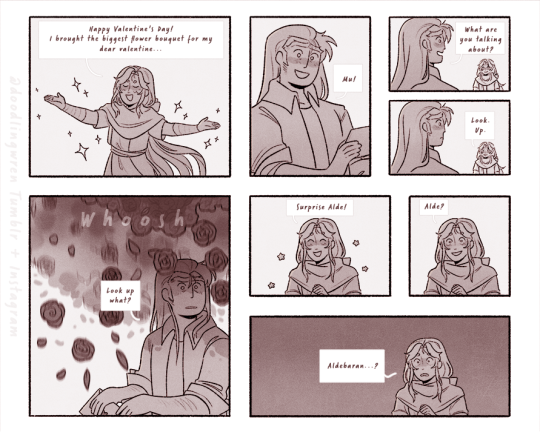
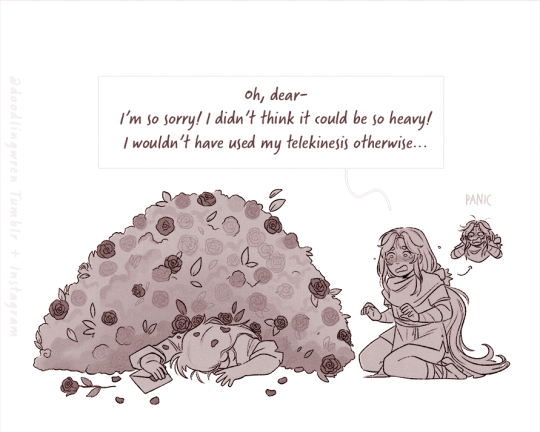

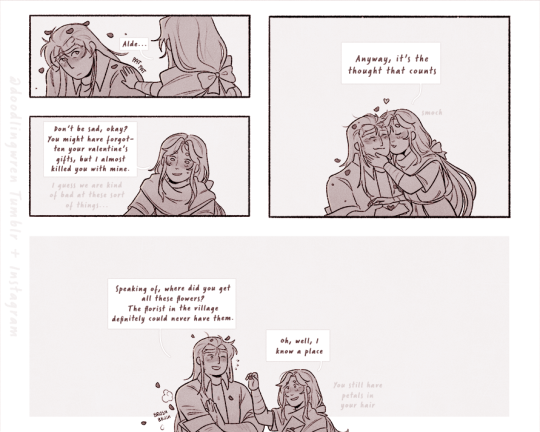
My silly contribution to the Aldemu Event for Valentine's Day :)
#wren draws stuff#I bring this one silly vibe to the Saint Seiya fandom. That definitely isn't the right one... but I have yet to be stopped#fanart#comics#saint seiya#saint seiya fanart#los caballeros del zodiaco#les chevaliers du zodiaque#i cavalieri dello zodiaco#aries mu#taurus aldebaran#aldemu#aldemuvday2k24#Do you remember when I said I was coloring a comic? yes well it's NOT this one#When I'll post THAT one you will recognize it#bc you will go like... can't believe this fucker spent all her time on this 🤨🤨🤨#anyway happy valentine's day#valentine's day#LOOK UP 👁👁#lol forgot to turn on the reblogs sorry <33
71 notes
·
View notes
Text
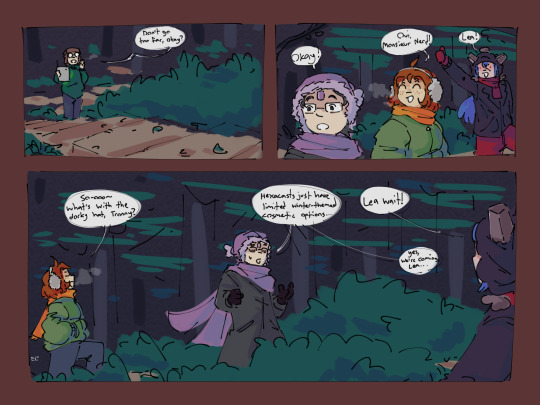
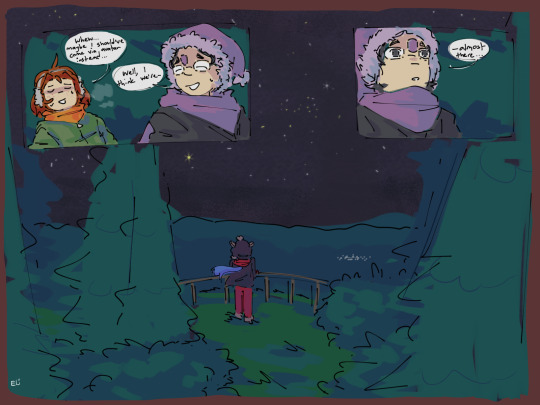
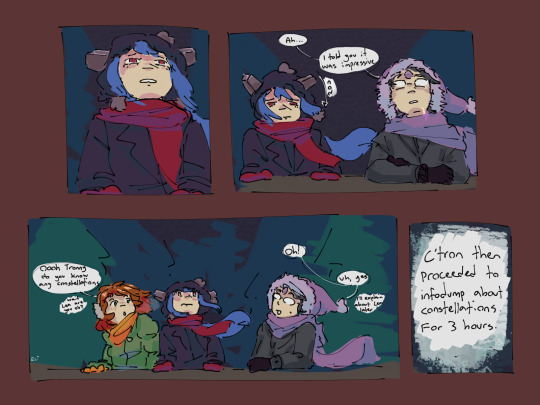
Lea… do you remember what a clear sky looks like at night?
Out in the countryside, no town or city nearby?
I hope one day you will…
#crosscode#lea#sergey#emilie#c'tron#scribblins#i spent half of yesterday doing this and i can't believe i actually finished it LOL#anyway i've had this idea in my head for a long time#i just really like the idea of lea getting to see a proper night sky for the first time#cause i think a lot about that one memory with her and sidwell talking about the night sky#'a boundless sea of stars' is probably the quote that's stuck with me the most i really love it#that and 'we are just another type of creature lost in this vast universe'#dude's a natural poet it's shame about literally everything else#anyway not to brag about my own comic but i think my favourite touch here is that emilie and sergey's breath is both visible#but not lea and c'tron bc they're. yknow. using instant matter avatars#don't ask how they're there off shadoon it's probably something something trialling instant matter generators#also i tried to make it as spoiler free as possible#kind of like. If You Know You Know type deal
100 notes
·
View notes
Text

Do you see this shit, Snufkin?
I've missed drawing my round boy so much 😭 Despite being in an animation school, we're not doing a lot of animation in first year. But because I had a bit of time and energy tonight, I thought I'll try animating something. I'm so glad I did! I'm a lot quicker and precise now, and it's so nice to have a reminder of why you're working so hard. I love animating so much, I had almost forgetten how happy it makes me!
#moomin#moomins#moominvalley#moomintroll#animation#2d animation#art#my art#i can't believe this took me 1h30#back a few months ago I could have spent half a day on this!#it seems so easy now#sorry i'm not very much active on here anymore#i have a social life now it takes some time haha#and school too of course
415 notes
·
View notes
Text
What's the average language like?
This will be a giant of a post, because this is a subject that I really like. So much of what we think about language just isn't true when you look at the majority of them and I'm not even going into how the languages themselves are constructed, only the people speaking them, if that makes sense. It will make sense in a moment, I promise
First, let's discuss assumptions. When you think of the abstract idea of a language, what do you imagine?
How many speakers?
Where is it spoken geographically?
Do speakers of the language only speak that language or do they speak at least one other language? How many more languages?
Is the language tied to a state/country?
Is the language thriving or endangered?
In what domains is the language used? (home, school, higher education, administration and politics, in the workplace, in popular media...)
Is the language well documented and supported? Are there resources like dictionaries to look up words in, does google translate work for it, does Word/google docs work etc?
Is the language spoken or signed?
Is the language written down? Is it written down in a standardised way?
Do you see where I'm going with this? My perspective on what a language is has completely shifted after studying some linguistics, and this only covers language usage and spread, not how words and grammar work in different languages. Anyways, let's talk facts. (if no other sources are given the source is my uni lectures)
How many speakers does the average language have?
The median language has 7 600 native speakers.
7 600 people is the median number of speakers. Half the world's languages have more, half have less.
Most languages in this tournament have millions of speakers. But maybe that's relatively common? After all, half of the world's languages have more than 7 600 speakers. No.
94% of all languages have less than a million speakers.
Just so you know, big languages are far from the norm. There are 6700-6800 living languages in the world (according to ethnologue and glottolog, the two big language databases. I've taken the numbers for languages having a non-zero number of speakers and not being classed as extinct respectively. Both list more languages).
6% of 6700-6800 languages would be around 400 languages with more than a million speakers. Still a lot, but only a (loud) minority. It's enough to skew the average number of speakers per language upwards though. Counting 8 billion people and 6800 languages, that's almost 1.2 million people per language on average. The minority is Very loud.
Where are most languages spoken?
First of all, I'll present you with these graphs (data stolen from my professor's powerpoint) which I first showed in this post:
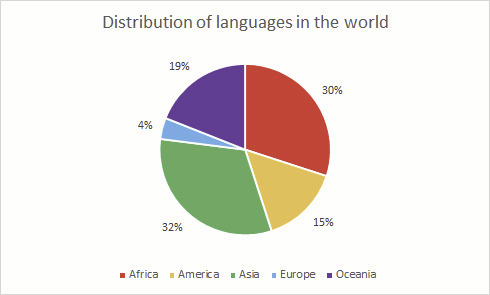
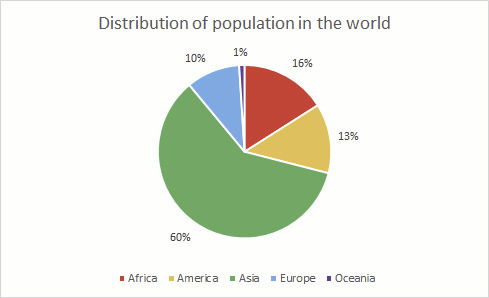
49% of all languages are spoken in Africa and Oceania, a disproportionately large amount compared to their population. On the other hand, Europe and Asia have disproportionally few languages, though Asia still has the largest amount of languages. Curious, considering Europe is often thought of as a place with many languages.
Sub-Saharan Africa is a very linguistically interesting place, but we need to talk about New Guinea. One island with 6.4 million people. Somehow over 800 languages. If you count the surrounding islands that's 7.1 million people and 1050 languages. Keep in mind that there are 6700-6800 languages in the world, so those 1050 make up more than a seventh of all languages. The average New Guinean language has less than 3000 speakers. Some are larger, but still less than 250 000 speakers. Remember, this is a seventh of all languages. It's a lot more common than the millions of speakers situation!
So yeah, many languages both in and outside New Guinea are spoken by few people in one or a few villages. Which is to say a small territory. But 7600 speakers spread over a big territory will have a hard time keeping their contact and language alive, so it's not surprising.
Moving on, lets talk about...
Bilingualism! Or multilingualism!
Is it common to speak two or more languages? Yes, it is. This is the situation in most of the world and has been the case historically. Fun fact: monolingual areas are uncommon historically and states which have become monolingual became so relatively recently.
One common thing is to learn a lingua franca in addition to your native language, a language that most people in the area know at least some of so you can use it to communicate with people speaking other languages than you.
As an example, I'm writing this in English which isn't my native language and some of you reading this won't have English as your native language either. Other examples are Swahili in large parts of eastern Africa and Tok Pisin in Papua New Guinea (the autonomous state, not the entire island).
Speakers of minority languages often have to learn the majority language in the country too. It's difficult to live somewhere where most daily life takes place in one language without speaking at least some of it. This is the case for native people in colonised countries, immigrants and smaller ethnic groups just to mention a few situations. All countries don't have majority languages, but some are larger, more influential and used for things like administration, business and higher education. It's common for schooling to transition from local languages to a larger language or lingua franca in countries with many languages.
Another approach than the lingua franca is learning the language of villages or towns surrounding you, which is very common in New Guinea and certainly other parts of the world too. It's not unusual to know multiple languages, in some places in sub-saharan Africa people speak five or six languages on a village level. Monolingualism is a weird outlier.
Speaking of monolingualism, let's move on to...
Languages and countries
This is a big talking point, mostly because it affected my view of language before I started thinking about it. First of all, I'm going to talk about the nation state and how it impacts languages within it and the way people view language (mostly because it's a source of misconceptions which fall apart as soon as you start to think about them, but if you don't the misconceptions will stay). Then I'll move on to countries with lots of languages and what happens there instead.
So, the nation state
The idea is that the people of a nation state share a common culture, history, values and other such things, the most important here being language. We can all agree that this type of nationalism has done lots of harm to various minorities and migrants all over the world, but it's still an idea that has had and still has a big impact on especially the western world. The section on nation states will focus on the West, because that's the area I know enough about to feel comfortable writing about in this regard.
How do you see this in common conceptions of language? It's in statements and thoughts like this: In France people speak French (but what about Breton? Basque? Corsican? Various Arabics? Some of the other 15 indigenous and 18 non-indigenous languages established in France? What about people speaking French outside of France?), in the US people speak English (but what about the 197 living indigenous languages? Or the 34 established non-indigenous languages? And the many extinct indigenous languages forcibly killed by the promotion of English?).
In X country people speak X, except for the people who don't, but let's ignore them and pretend everyone speaks X. Which most might actually do if it's the single national language that's used everywhere, it's common to learn a second language after all.
This is of course a simplified (and eurocentric) picture, as many countries either have multiple national languages or recognise at least some minority languages and give them legal protection and rights to access certain services in their languages (like government agency information). Bi-/multilingual signage is common and getting more common, either on a regional or a national level. Maybe because we're finally getting ready to move on from one language, one people, one state and give indigenous languages the minimum of availability they need to survive.
I wrote a long section about how nation states affect language, but I realised that veered way off topic and should be its own post. The short version is that a language might become more standardised simply by being tied to a country and more mobility among the population leading to less prominent dialects. There's also been (and still is) lots of opression and attempts to wipe out minority (often indigenous) languages in the name of national unity. Lots of atrocities have been comitted. Sometimes the same processes of language loss happen without force, just by economic pressure and misconceptions about bilingualism.
What does this have to do with the average language?
I simply want to challenge two assumptions:
That all languages are these big national languages tied to a country
That it's common that only one language is spoken within a country. If you look closer there will be smaller languages, often indigenous and often endangered. There are also countries in the West where multiple languages hold equal or similar status (just look at Switzerland and its four official languages)
Starting with the second point, let's take a look at how Europe is weird about language again
Majority languges aren't universal
I'm going to present you with a list of the 10 countries with the most living languages, not counting immigrant languages (list taken from wikipedia, which has Ethnologue as the source):
Papua New Guinea, 840 languages
Indonesia, 707 languages
Nigeria, 517 languages
India, 447 languages
China, 302 languages
Mexico, 287 languages
Cameroon, 274 languages
Australia, 226 languages
United states, 219 languages
Brazil, 217 languages
DR Congo, 212 languages
Philippines, 183 languages
Malaysia, 133 languages
Chad, 130 languages
Tanzania, 125 languages
This further challenges the idea of one country one language. Usually there's a lingua franca, but it's not always a native language and it's not always the case that most are monolingual in it (like the US or Australia, both of which have non-indigenous languages as widespread lingua francas). Europe is the outlier here. People might use multiple languages in their day to day lives, which are spoken by a varying number of people.
In some cases the indigenous or smaller local languages are extremely disadvantaged compared to one official language (think the US, Australia and China), while in other places like Nigeria, several larger languages are widely used in their respective areas alongside local languages, with English as the official language even though it's spoken by few people.
It's actually pretty common in decolonised countries to use the colonial language as an official language to avoid favoring one ethnic group and their language over others. Others simply don't have an official language, while South Africa's strategy is having 12 official languages (there are 20 living indigenous languages and 11 non-indigenous languages in total, and one of the official ones is English, so not all languages are official with this strategy either). Indonesia handled decolonisation by picking a smaller language (a dialect of Malay spoken by around 10% at the time, avoiding favouring the Javanese aka the dominating ethnic group by picking their language), modifying it, and started using it as the new national language Indonesian. It's doing very well, but at the cost of many smaller languages.
Going back to the list, it's also interesting to compare the mean speaker number (if every language in a country was spoken by the same amount of people) and the median speaker number (half have more speakers, half have less). The median is always lower than the mean, often by a lot. This means that the languages in a country don't have similar speaker numbers, so one or a few languages with lots of speakers drive the average upwards while the majority of languages are small. Just like for the entire world.
The US and Australia stand out with 12 and 10 median speakers, respectively. About 110 languages in the US have 12 or fewer native speakers. The corresponding number for Australia is 113 languages with 10 or fewer speakers. There are some stable languages with few speakers documented, but they have/had between 40 and 60 speakers, so those numbers point towards a lot of indigenous languages dying very soon unless revitalisation efforts succeed quickly. This brings us to the topic of...
Endangered languages
This is an interesting tool called glottoscope made by Glottolog which you can play around with and view data on endangered languages and description status (which is the next heading).
I'll pull out some numbers for you:
Remember those 6700 languages in Glottolog? That's living languages. How many extinct languages are listed?
936 extinct languages. That's ~12,5% of the languages we know of. (Glottolog doesn't include reconstructed languages like Proto-Indo-European, only languages where we either have enough remaining texts to conclude it was a separate language or reliable account(s) that conclude the same. We can only assume that there are thousands of undocumented languages hiding in history that we'll never know of)
How many more are on the way to become extinct?
Well, only 36% (2800 languages) aren't threatened, which means that the other 64% are either extinct or facing different levels of threat
What makes a language threatened? The short answer is people not speaking the language, especially when it's not passed down to younger generations. The long answer of why that happens comes later.
306 languages are listed as nearly extinct and 412 more as moribound. That means that only the grandparent generation and older speak it and the chain of transmission to younger generations has broken. These two categories include 9,26% of all known languages.
The rest of all languages either fall into the threatened or shifting category. The threatened category means that the language is used by all generations but is losing speakers. The shifting category refers to languages where the parental generation speaks the language but their children don't. In both of these cases it's easier to revive the language, since parents can speak to the children at home instead of having to rely on external structures (for example classes in the heritage language taught like foreign language classes in schools).
Where are languages threatened?
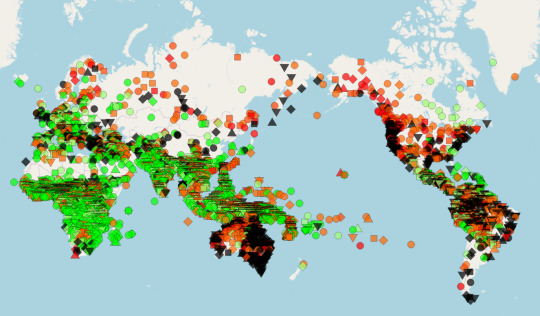
This map is also from glottoscope and can be found here. I recommend playing around with it, you can zoom in and hover over every dot to see which language it represents. The colours signify threat level: green for not threatened, light green for threatened, orange for shifting, red for moribound and nearly extinct, and black for extinct. I'll come back to the shapes later.
As you can see, language death is more common in certain areas, like Australia, Siberia, North America and the Amazon, but it's still spread over the entire world.
Why are languages going extinct?
There are two important dimensions to the vigorousness of a language: The first is the number of speakers who claim the language as their own and speak it with each other. No speakers means no language. If all speakers move to different places or assimilate by shifting to a dominant language in the area (sometimes for work opportunities or for their childrens' future work opportunities. Sometimes because of which language(s) schools are taught in or disinterest from the children in the language and culture. Sometimes migration of an ethnic group for various reasons leads to language shifts. There are many complex reasons to why the link of transmission can break)
The other dimension, which ties into the first one, is the number of situations in which a language is used. There are many domains a language can be used in, like at home, in school, in the workplace, in politics and administration, in higher education, for international communication, in religious activities, in popular media like movies and music etc. When a language is no longer or never used in a particular domain, it might lose the associated vocabulary. When it becomes confined to a singular domain like the home, the usage goes down. The home is usually the last place an endangered language is spoken.
Usage in a domain is a reason to speak or hear the language. It's a reason to keep it alive. People also forget or get worse at languages they don't use. That's why a common revitalisation tactic is producing movies, radio programmes, news reporting, books and other media in a dying language. It gives people both reason and opportunity to use their language skills. Which language is used in schools is also important, as it keeps basic vocabulary for sciences and explaining the world alive. Another revitalisation tactic is making up new words to talk about modern concepts, some examples are the Kaqchikel word rub'eyna'oj from this tournament or creating advanced math vocabulary in Māori.
What does endangered languages have to do with the average language?
Trying to get this post back on track, these are some key points:
64% of all documented languages are either extinct or facing some level of threat. That's the majority of all language
Even excluding the extinct languages, the majority of languages are threatened or worse
This means that the average language is facing a loss of speakers, some more disastrous than others. Being a minority language in an increasingly globalized world is dangerous
Describing a language
Are you able to look up words from your native language in a thesaurus or a dictionary? What about figuring out how a certain piece of grammar works if you're unsure? Maybe you don't need that for your native language, but what about a second language you're learning?
If your native language is English, there are lots of resources, like online and book dictionaries/thesauruses or an extensive grammar (a book about how English grammar works). There's also a plethora of websites and courses to learn English, and large collections of written text or transcribed speech. If a linguist wants to know something about the English language there's an abundance of material. If someone wants to learn English it's easy and courses are offered in most parts of the world.
For other languages, the only published thing might be a list of 20 words and their translation into English or another lingua franca.
Let's take a look at the same map as earlier, but toggled to show documentation status in colour and endangerment status with shapes:
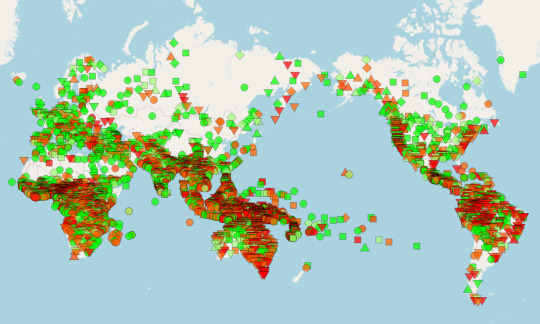
Here, the green signifies a long grammar and the light green a grammar. Both are extensive descriptions of the grammar in a language, but they differ in length. A long grammar has to contain over 300 pages and a grammar over 150. Orange is another type of grammar, namely a grammar sketch. Those are brief overviews of the main grammatical features or features that may be of interest for linguists, typically between 20 and 50 pages. The purpose isn't to be a complete grammar, only a starting point.
The red dots can signify a lot of things, but what they have in common is that there's no extensive description of the grammar. In those cases, the best description of the language might be a list of which sounds it contains, a paper about a specific feature, a collection of texts or recordings, a dictionary, a wordlist (much shorter than dictionaries) or just a mention that it exists.
Why are grammars and descriptions even important?
The better described a language is, the easier it is to learn it and study it. For a community facing language loss, it might be helpful to have a pedagogical grammar or a dictionary to help teach the language to new generation. If the language becomes extinct people might still be able to learn and revive it from the documentation (like current efforts with Manx). It also makes sure unique words or grammatical features as well as knowledge encoded in the language isn't lost even if the language is. It's a way of preserving language, both for research and later learning.
What's an average amount of descripion then?
36,2% of all documented languages have either a grammar or a long grammar. That's pretty good actually
38,2% of all documented languages would be marked by a red dot on this map, meaning that more languages than that don't have any kind of grammar at all, maybe only as little as a short list of words
The remaining 25,6% have a grammar sketch
So as you see, the well documented languages are in minority. On the brighter side, linguists are working hard at describing languages and if they keep going at the same rate as they have since the 1950s, they'll reach the maximum level of description by 2084. Progress!
Tying into both description of languages and domains where language is used...
What about technology and language?
There are many digital tools for language. Translation services, spelling and grammar checks in word processors, unicode characters for different scripts and more. I'm going to focus on the first two:
Did you know that there are only 133 languages on google translate? 103 more are in the process of being added, but that's still a tiny percentage of all languages. As in 2% right now and 3,5% once these other languages are added going with the 6700 language estimation.
Of course, this is for the most part a limination with translation technology. You need translated texts containing millions of words to train the algorithms on and the majority of languages don't have that much written text, let alone translated into English. The low number still surprised me.
There are 106 official language packs for Windows 10 and I counted 260 writing standards you can use for spelling checks in Word. Most were separate languages, but lots were different ways to write the same language, like US or British English. That's a vanishingly small amount. But then again:
Do all languages have a written standard?
No. That much is clear. But how many do? I'll just quote Ethnologue on this:
"The exact number of unwritten languages is hard to determine. Ethnologue (25th edition) has data to indicate that of the currently listed 7,168 living languages, 4,178 have a developed writing system. We don't always know, however, if the existing writing systems are widely used. That is, while an alphabet may exist there may not be very many people who are literate and actually using the alphabet. The remaining 2,990 are likely unwritten."
(note that Ethnologue classes 334 languages without speakers as living, since their definition of living language is having a function for a contemporary language community. I think that's a bad definition and that means it differs from figures earlier in the post)
Spoken vs signed
My last point about average languages is about signed languages, because they're just as much of a language as spoken ones. One common misconception is that signed languages reflect or mimic the spoken language in the area, but they don't. Grammar works differently and some similarities in metaphor might be the only thing the signed language has in common with spoken language in the area.
Another common misconception is that there's only one sign language and that all signers understand each other. That's false, signed languages are just as different from each other as spoken languages, except for some tendencies regarding similarity between certain signs which often mimic an action (signs for eating are similar in many unrelated sign languages for example).
Glottolog lists 141 Deaf sign languages and 76 Rural sign languages, which are the two types of signed language that become entire languages. The difference is in reach.
Rural signs originate in villages with a critical amount of deaf people (around 6) that make up a fully fledged language with complete grammar to communicate. Often large parts of the village learn tha language as well. There are probably more than 76, that's just the ones the linguist community knows of.
What's called Deaf sign languages became a thing in the 1750s when a French guy named Charles-Michel de l'Épóe systematised and built onto a rural sign from Paris to create a national sign language which was then taught in deaf schools for all deaf children in France. Other countries took after the deaf school model and now there's 141 deaf sign languages, each connected to a different country. Much easier to count than spoken languages.
Many were made from scratch (probably building on some rural sign), but some countries recruited teachers from other countries that already had a natinonal sign language and learnt that instead. Of course they changed over time and with influence from children's local signs or home signs (rudimentary signs to communicate with hearing family, not complete languages), so now there's sign language families! The largest one unsurprisingly comes from LSF (Langue des Signes Française, the French one) and has 63 members, among them ASL.
What does this have to do with average languages? Well, languages don't have to be spoken, they can be signed instead. Even if they make up a small share of languages, we shouldn't forget them.
Now for some final words
Thank you for reading this far! I hope you found this interesting and have learned something new! Languages are exciting and this doesn't even go inte the nitty gritty of how different languages can be in their grammar, sounds and vocabulary. Lots of this seem self evident if you think about it, but I remember how someone pointing out facts like this truly shifted my perspective on what the language situation in the world truly looks like. The average language is a lot smaller and diffrerent from the common idea of a language I had before.
Please reblog this post if you liked it. I spent lots of time writing it because I'm passionate about this subject, but I'd love if it spread past my followers
#linguistics fun fact time!#anyways can't believe this is finally done#i was going to make a series with informative posts between each round#and look what happened#i spent all my time writing this instead#hope you enjoyed!#and check out the linguistics fun facts tag#there are some more posts like this#linguistics
82 notes
·
View notes
Text
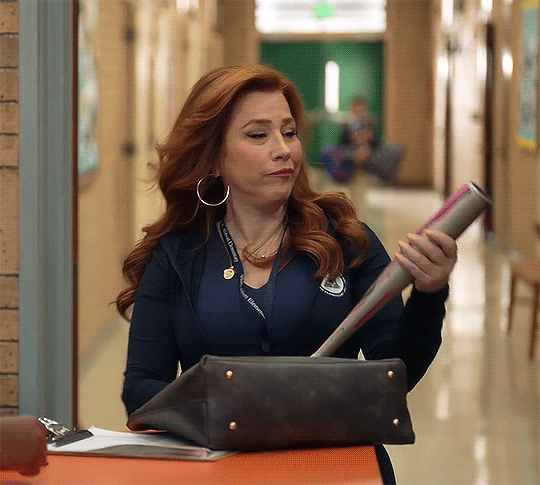



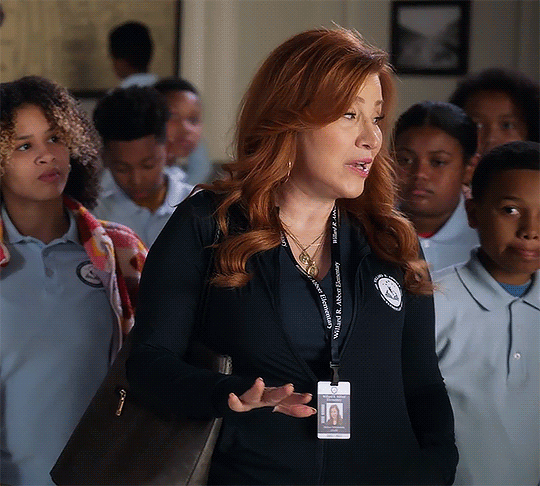
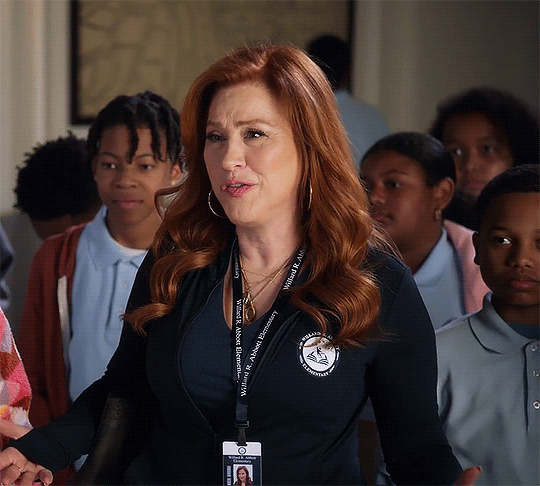

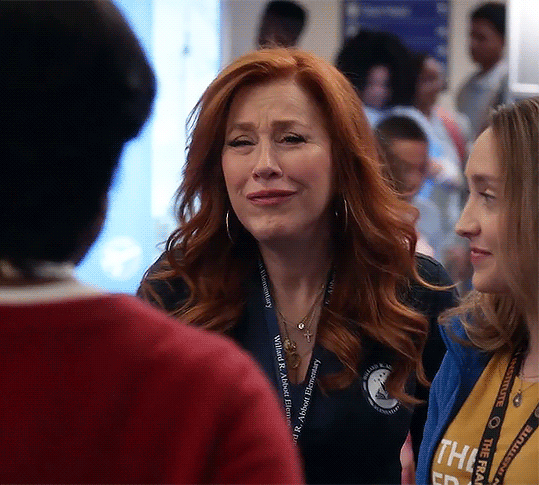
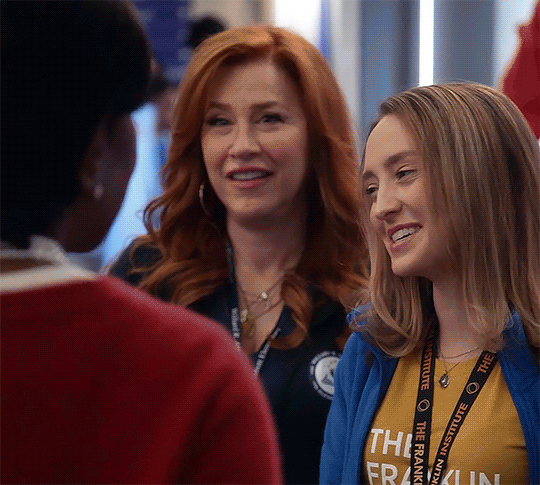

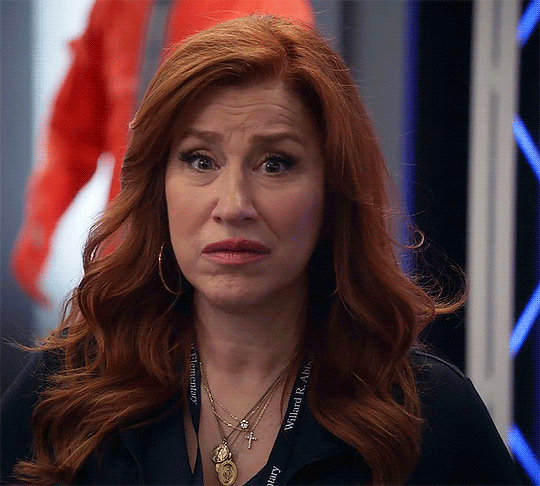





"Don't be embarrassed. You're aging with dignity. Meanwhile, I gotta pack an extra pair of underwear if I'm planning on laughing that day."
Lisa Ann Walter as Melissa Schemmenti in Abbott Elementary | 02×22: Franklin Institute
+ bonus cause they are so precious 🥹
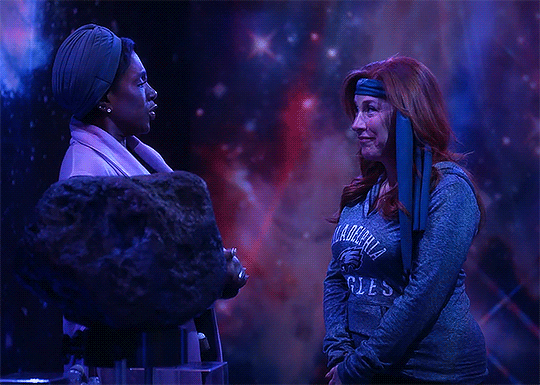
#melissa schemmenti#lisa ann walter#abbott elementary#abbottelementaryedit#abbottelementarygifs#abbottedit#abbottgifs#dailyabbottelementary#notsosecretlyalesbian#my gifs#i love and hate some of these#i feel like they look so bad but I already spent too much time on them and I can't figure out what's wrong#but I can't believe the season is over. i'll miss my weekly giffing session#and for those of you who are still interested: yes i am going to gif all of the episodes from season 2... eventually
339 notes
·
View notes
Text
Flirting and Feelings(Rise! Leo x Reader)
A/N, not important: Hate this with all my heart. I can't write. Going to scream. This was going to be so much longer, but if I have to spend any more time on it, I'm going to rip my hair out. Any criticism is welcome, constructive or not. This is supposed to be a gender neutral reader, so if I screwed up somewhere, please tell me.
-Ollie
Tw: bad writing, emotions, Leo gets really anxious for a minute there
Words: 1485
Summary: ROTTMNT Leo decided to boldly flirt but the reader thinks he's making fun of them.
Leo keeps his gaze on the human in the doorway, a dreamy look in his eyes as he watches them laugh with Mikey in the kitchen. It was hard for Leo to stay silent, wanting nothing more than to go up to his crush friend and start talking to them. Being able to only watch the two talk, the two cook, hurt. Leo had talked to Mikey earlier to confirm they didn’t each have a crush on the same person, Leo almost giddy with joy when Mikey denied feeling any romantic attraction towards (Y/n). Leo was confident Mikey remembered the plan, Mikey having felt bad for Leo’s inability to converse with his crush. All Leo needed to do was wait for the signal, and he could go talk to (Y/n). Alone. Leo gulped, taking in a deep breath trying to calm his nerves. He’d have to wait for them to put whatever they were making into the oven first anyway, he had time. He just had to memorize what to say.
Leo looks back to his phone, a light dust of red across his snout and spreading to his cheek bone refuses to fade, the anticipation making his heart beat furiously. The wikiHow article wasn’t the most helpful, but it was better than Donnie’s advice.(He appreciated it, but Leo had the feeling that ignoring (Y/n) and not talking to them at all wouldn’t help.) The only thing that resonated with Leo was to flirt. Leo was confident he could do that, and most likely do it well. Leo was the face man after all, smooth talking was his thing!
Leo’s head perks up once more as he hears the shut of the oven, Mikey saying something to (Y/n) Leo couldn’t quite hear. Leo watches carefully as Mikey exits the kitchen with his hands behind his back, whistling the opening tune to the Jupiter Jim 8 episode mini series: The Galactic 7. Mikey winks at Leo before going down one of the many adjoined tunnels in the lair, leaving Leo’s sight. Leo beams, his hands tapping his thighs nervously. The whistling tune was the signal, he had around 30 minutes to go do what he wanted. A romantic confession between two people who were certainly destined to fall in love. At least, that’s what Leo hoped.
Swallowing his fear, Leo stands up and rubs his sweaty palms on his bike shorts, making his way to the kitchen. Knocking slightly on the wooden cabinet by the entrance to alert them to his presence, Leo shoots (Y/n) the smuggest grin he could muster. (Y/n) gives Leo a small wave return, acknowledging him before returning back to their phone. Leo’s confidence crumbles slightly at this, having wanted a more definite confirmation that he was welcome in their presence. Leo shrugs it off though, his wide grin still plastered on his face despite the vice around his chest.
Leo leans against the island counter, drumming his knuckles against the hard surface. (Y/n) glances at Leo, their eyes scanning his as they attempt to decipher what the turtle mutant was doing. Leo picks up one of his hands, halting the small rhythm being beaten into the faux wood surface and gives (Y/n) a small wave. Leo’s face softens as the human rolls their eyes, chuckling softly. The butterflies tormenting his stomach calm slightly, his chest filling with air once more.
“You feeling okay?” The sudden sound of their voice makes Leo jump slightly, the haze lifting off his brain. Leo lets out a small laugh, a brighter, softer smile replacing the previous smug one.
“Yeah, I’m fine. Do you have a Band-aid though?” Leo’s confidence quickly returns as he asks his question, his brain staticky as he tries to keep his hands from shaking. This was it. He was going to tell them. Sure, he was going to tell them through a dorky pick-up line, but tell them nonetheless.
(Y/n) shifts in their position, putting their phone on the island as they pat their pockets. They frown slightly, looking up at Leo with concern that made his heart melt. “Nope, sorry. Do you need me to run to the bathroom to get you one?”
Leo just about died at that, feeling touched they cared enough to offer to go get one for him. He felt slightly guilty now, knowing he wasn’t actually injured. “No, it’s fine. I just scraped my knees when I fell for you.” Leo accompanies the delivery of the line with a wink, a small blush adorning his face once more. It felt off to Leo, he knew he said it wrong. It didn’t flow out of his mouth the way he wanted it to, and he felt his chest tighten up again. Leo scans their face, his bright smile seeming more nervous as he awaits (Y/n)’s response.
And waited.
And waited.
Leo’s smile falls completely at (Y/n)’s reaction, or lack thereof, as he starts twiddling with his fingers laughing nervously. (Y/n)’s face is blank, their forefinger tapping the counter as they look at Leo with their eyebrows furrowed. Leo didn’t understand. He expected a reaction at the very least, not judging silence. Leo chewed on the inside of his cheek, laughing nervously as he opened his mouth to speak. “Hey, look I’m-”
“Don’t say something you don’t mean.”
Leo’s taken aback by their sudden words, their face not changing from the annoyed look. Leo sinks slightly at the interruption, not knowing how to respond. “Excuse me?”
(Y/n) sighs, their body shifting to lean on their right arm while their left hand pinches the bridge of their nose in frustration. They let out a tired sigh, and Leo’s heart sinks into his stomach. Leo didn’t understand what he did wrong. Were they mad at him? Why was their first thought that Leo was lying? Did they really dislike Leo this much?
“The pick-up line. Don’t say it if you don’t mean it.” They finally clarified, their arms now crossed. Leo pats his thighs awkwardly, feeling stupid and pathetic. How did he mess up so badly he made the one person he finally loved believe his feelings were a joke? Leo regretted trying, regretted not listening to Donnie. Maybe this all would’ve gone better if Leo just ignored his feelings until they disappeared.
Leo racks his brain, trying to find the best way to explain why he did what he did. In the end, only four simple words popped out. “I meant every word.”
(Y/n) gives Leo a look he can’t quite decipher, his mask mimicking furrowing eyebrows as he scans them. (Y/n) visibly chews on their cheek, huffing slightly. “Do you mean it?”
Leo nods, swallowing nervously as his fingers tap out a nonsensical rhythm into the counter. (Y/n)’s face finally has a smile, small chuckles falling from their lips. (Y/n) reaches their hand out, setting it on top of Leo’s own shaking appendage. Leo’s eyes softened, his face one of worry but it was starting to settle. Leo meets (Y/n)’s eyes, trying to figure out the meaning of anything (Y/n) was doing.
“I like you too, Leo.”
Leo freezes at this, his brain frying for a moment as he processes (Y/n)’s words. They like him back. They like him back. Leo’s face finally breaks from the stress filled gaze as a large smile kicks his frown out of place. Leo pats the counter, his brain buzzing with excitement. Leo rounds the island while (Y/n) watches with a smile, a loud laugh coming from their mouth when Leo pulls them into a tight hug. Leo feels their arms wrap around him, their hands resting in the middle of his carapace. Leo was shaking slightly, his brain running a mile a minute as he held (Y/n) close. (Y/n) pats Leo’s back, pushing him off slightly as they let out an awkward laugh. Leo lets go, an embarrassed blush tinting his green cheeks red. Leo pats his thighs twice, looking around the kitchen to avoid (Y/n)’s gaze.
“So….” Leo starts, still avoiding (Y/n)’s eyes. Leo watches them lean their back against the wall, the dopey grin on (Y/n)’s face making Leo’s heart flutter. (Y/n) motions one of their hands in a circle, prompting Leo to continue. “Would you like to become my partner?”
(Y/n) snorts at this, laughing at his choice in wording. The human flashes Leo a wide smile, looking at Leo endearingly. “In crime, or romantic? Because both are a yes.”
Leo quickly pulls (Y/n) into another hug, rambling on and on about how happy he was, his voice loud as he cheers. (Y/n) just hugs Leo back and lets him ramble, happy to be in the moment.
#rottmnt#rise of the tmnt#tmnt#teenage mutant ninja turtles#rise of the teenage mutant ninja turtles#rise leo#rottmnt leo#tmnt fanfic#leonardo#lol i suck at writing#litteraly spent 3 days on this#can't believe I actually spent time on this#and it still turned out like trash#tmnt x reader#tmnt leo#leo x reader#rise leo x reader#rottmnt leo x reader#rottmnt leonardo#leo/reader#leonardo rottmnt#tmnt leonardo#rottmnt fanfiction#tmnt x y/n#leonardo x reader
203 notes
·
View notes
Text
ok been thinking abt time travel au where snakemouth gets rubber banded into their younger bodies. anyway how hard do u think it is to wake up from a decades long nap

#bug fables#hehe#my art#comic#leif#vi#anyway yall would not believe how much time i spent on that first panel lmao#i was like: oh i'll just add some basic shadows to make the comic less flat#and then i was like oh i can show the depth of the cave#and then it got a bit too detailed for what this comic calls for lmao#tt au#time travel aus#id in alt#dont u fucking dare tag as no id i have been adding alts to all my images for ages#like u can i can't stop u but i will be really sad cause i do make sure to add alt text for all my images :(#anyway bug fables art be upon ye
211 notes
·
View notes